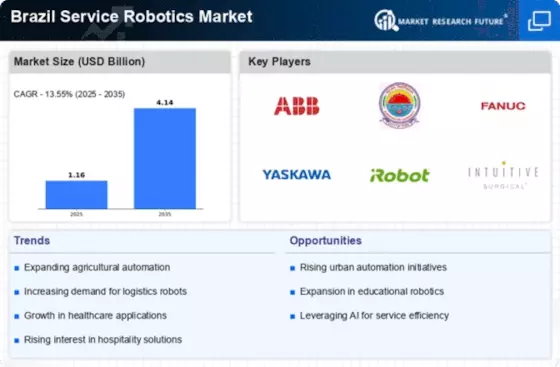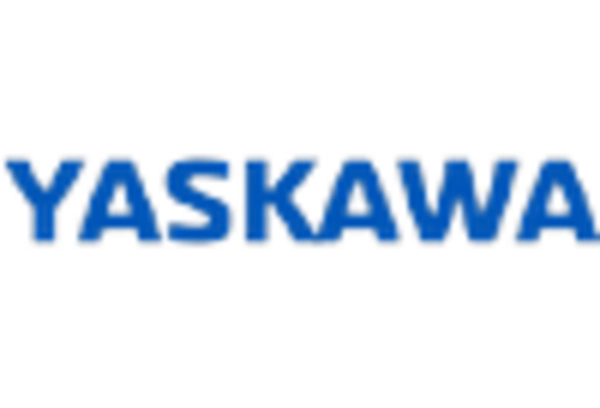Healthcare Robotics Adoption
The Brazil Service Robotics Market is experiencing a notable surge in the adoption of healthcare robotics. This trend is primarily driven by the increasing demand for efficient healthcare services, particularly in urban areas. The Brazilian government has been investing in healthcare infrastructure, which includes the integration of robotic systems for surgeries, rehabilitation, and patient care. For instance, the use of robotic surgical systems has been reported to enhance precision and reduce recovery times. According to recent data, the healthcare robotics segment in Brazil is projected to grow at a compound annual growth rate (CAGR) of approximately 15% over the next five years, indicating a robust market potential. This growth is likely to be fueled by advancements in technology and a growing acceptance of robotic solutions among healthcare professionals.
Hospitality Sector Automation
The hospitality sector in Brazil is increasingly embracing automation, which is a significant driver for the Brazil Service Robotics Market. With the rise in tourism and the need for enhanced customer experiences, hotels and restaurants are turning to service robots for tasks such as room service delivery, cleaning, and customer interaction. The Brazilian government has been supportive of this trend, promoting initiatives that encourage technological innovation in the hospitality industry. Recent statistics suggest that the market for service robots in hospitality is expected to reach USD 200 million by 2027, reflecting a growing trend towards automation. This shift not only improves operational efficiency but also enhances guest satisfaction, positioning Brazil as a competitive player in The Service Robotics.
Agricultural Robotics Development
The development of agricultural robotics is emerging as a vital driver for the Brazil Service Robotics Market. Brazil, being one of the largest agricultural producers globally, is witnessing a growing interest in robotic solutions to enhance farming efficiency. The government has been promoting research and development in agricultural technologies, which includes the use of drones and autonomous tractors. Recent reports suggest that the agricultural robotics market in Brazil is expected to reach USD 150 million by 2026, driven by the need for precision farming and sustainable practices. This trend not only addresses labor shortages but also enhances productivity, making Brazilian agriculture more competitive on the global stage.
Logistics and Delivery Innovations
Innovations in logistics and delivery services are significantly influencing the Brazil Service Robotics Market. The rise of e-commerce in Brazil has led to an increased demand for efficient delivery solutions, prompting companies to explore robotic technologies. Autonomous delivery robots are being tested in urban areas, aiming to streamline last-mile delivery processes. The Brazilian government has been actively promoting smart city initiatives, which include the integration of robotics in logistics. Recent market analyses indicate that the logistics robotics segment is expected to grow by over 20% annually, driven by the need for faster and more reliable delivery systems. This trend not only addresses consumer demands but also positions Brazil as a leader in logistics innovation in Latin America.
Manufacturing Sector Transformation
The transformation of the manufacturing sector in Brazil is a crucial driver for the Brazil Service Robotics Market. As Brazilian manufacturers seek to enhance productivity and reduce operational costs, the adoption of industrial robots is becoming increasingly prevalent. The government has implemented policies aimed at modernizing the manufacturing landscape, encouraging investments in automation technologies. Data indicates that the industrial robotics market in Brazil is projected to grow at a CAGR of 12% over the next five years, reflecting a shift towards smart manufacturing practices. This transformation is likely to improve product quality and operational efficiency, positioning Brazilian manufacturers competitively in the global market.
















